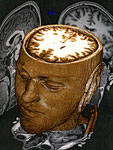Brain-based Research
Question

Cognitive/brain-based research is making leaps and bounds explaining the nature, make-up, and processes of the brain. Is anyone using brain-based research in the history classroom specifically? Is there a researcher or resource out there for teachers to go to?
Answer
In the past two decades, researchers in the United States have generated a substantial and informative body of knowledge about the nature of historical cognition, how students make sense of historical texts and tasks, and how teachers can promote or stifle students’ historical understanding. Below I identify a few key works and resources in this field that are useful for teachers.
A definitive and accessible source for what we know about how students learn in K-12 settings and implications for classroom practice continues to be the National Research Council’s How People Learn series. The volume in this series titled How Students Learn: History in the Classroom is most relevant to your question. You can browse this volume for free at the National Academies Website. Here you will find Professor Robert Bain’s study where he put into practice core principles of learning in his World History classroom and investigated the impact those practices had on student understanding. For a brief summary of Bain’s study, see our research brief. Additional chapters introduce core principles of learning such as engaging students’ prior understandings and organizing knowledge around core concepts, and include reports of studies done by British researchers Rosalyn Ashby, Peter J. Lee, and Denis Shemilt.
You will also want to investigate Stanford professor and cognitive psychologist Sam Wineburg’s research. Wineburg’s seminal work on historical cognition uncovered specific reading processes that distinguished expert historical thinkers from those more novice in the discipline. You can find his book Historical Thinking and Other Unnatural Acts at your favorite bookstore. Check out Chapter Two of this book for an overview of investigations into history learning and teaching (still relevant even if first published a decade ago). Also see this research brief summarizing one of Wineburg’s important studies.
Browse additional research briefs to find more studies specific and relevant to history teaching and learning. The number of researchers working in this field is growing, and you will find several whose work is represented here. (With a few exceptions, we focus on research done by researchers in the United States. But the international landscape also encompasses a burgeoning and significant field.)
Exploring any of the above resources will lead you to additional useful studies if you pay attention to the works cited by the authors.
- Not only can you find studies and people who are investigating history teaching and learning through browsing our research briefs, each of these briefs includes a set of classroom implications or “teaching tips.”
- Annenberg Media offers a free professional development course titled The Learning Classroom: Theory Into Practice that focuses on translating what scholars know about how people learn into classroom approaches and practices. This course, based on the How People Learn series, addresses all the subject areas; but there are a few segments focused specifically on history (find one here).
- The Research and Practice feature that appears periodically in the National Council of Social Studies journal, Social Education, can be a good resource as can research journals like Cognition and Instruction where scholars initially publish their studies.
Cognitive research has much to offer educators in understanding how to structure and shape learning environments, teaching practices, and student tasks. Just beware of the cottage industry that has built up around this field. As with other educational hot topics, some vendors are building resources where profit, rather than accuracy or reliability, is the goal.
Your approach is a good one to guard against this. Go to the studies, read the research yourself, and find trusted and reliable sources. Check the citations used by those marketing these ideas and ask questions like: are these studies published in respected and peer-reviewed scholarly journals? Do they build on existing bodies of scholarship? Is the theory sound? Are there empirical studies that back up these approaches? Are teaching implications closely tied to findings?
Good luck!
